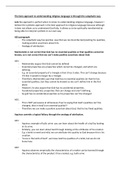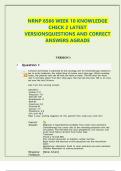The best approach to understanding religious language is through the cataphatic way
LoA: No approach is perfect when it comes to understanding religious language, however I
believe the symbolic approach is the best approach to religious language because although
it does not allows us to understand God fully, it allows us to be spiritually transformed by
being able to interpret symbols in our own way
A01 paragraph:
- The cataphatic way/via positiva: says that we can describe God positing his qualities,
making positive assertions about him.
- Analogy of attribution:
Maimonides is not correct that God has no essential qualities or that qualities cannot be
known, so is not correct that we can’t make positive assertions about God.
A01:
- Maimonides argues that God cannot be defined
- Essential properties are properties which cannot be changed, and which are
defining.
- E.g. an essential property of a triangle is that it has 3 sides. This can’t change because
if it did, it would no longer be a triangle.
- Therefore, Maimonides says that God has no essential qualities (or that he has
essential qualities, but they cannot be known) as we can’t define him in the first
place.
- However, he also argues that God has no accidental properties.
- Accidental properties: properties that can change and aren’t defining.
- So god has no accidental properties as his properties can’t be changed
A02:
- This is NOT persuasive at all because if we’re saying that God’s qualities can’t be
changed, that in itself is an essential quality!!!
- Therefore we can make a positive assertion about God, that he has fixed qualities.
Aquinas commits a logical fallacy through the analogy of attribution.
A01:
- Aquinas: example of bulls urine: you can learn about the health of a bull by looking
at its urine.
- Similarly, you can learn about God through looking at the attributes of his creation
- E.g. a lamb is meek and mild, we can attribute this quality to God because this is his
creation.
- “Jesus is the lamb of God”, we know God has qualities of a lamb, but we do not
know how.
A02:
- Aquinas observes empirically the characteristics of a maker can be learned through
the characteristics of the product it has created, e.g. bulls urine






